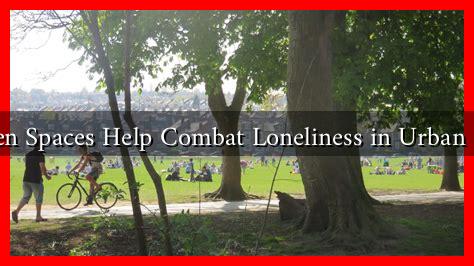-
Table of Contents
Can Open Spaces Help Combat Loneliness in Urban Settings?
In an age where urbanization is at an all-time high, loneliness has emerged as a significant public health concern. The World Health Organization has identified loneliness as a growing epidemic, particularly in urban environments where people often live in close proximity yet feel isolated. This article explores the potential of open spaces in urban settings to combat loneliness, enhance social interactions, and improve overall well-being.
The Urban Loneliness Epidemic
Loneliness is not merely a feeling; it can have profound effects on mental and physical health. Studies have shown that chronic loneliness can lead to various health issues, including depression, anxiety, and even cardiovascular diseases. According to a report by the National Institute on Aging, loneliness can increase the risk of mortality by 26%.
Urban areas, with their dense populations and fast-paced lifestyles, often exacerbate feelings of isolation. Factors contributing to urban loneliness include:
- High population density without meaningful social connections.
- Increased mobility leading to transient communities.
- Digital communication replacing face-to-face interactions.
The Role of Open Spaces
Open spaces, such as parks, plazas, and community gardens, can serve as vital social hubs that foster connections among residents. These areas provide opportunities for interaction, recreation, and relaxation, which can significantly reduce feelings of loneliness. Here are some ways open spaces can help:
1. Encouraging Social Interactions
Open spaces create environments where people can meet and engage with one another. Activities such as picnics, sports, and community events can draw individuals together, fostering a sense of community. For instance, the High Line in New York City has transformed an abandoned railway into a vibrant public park that attracts millions of visitors each year, encouraging social interactions among diverse groups.
2. Promoting Mental Well-being
Access to nature and green spaces has been linked to improved mental health. A study published in the journal Environmental Science & Technology found that spending time in natural environments can reduce stress and enhance mood. Urban parks provide a respite from the hustle and bustle of city life, allowing individuals to recharge and connect with their surroundings.
3. Facilitating Community Engagement
Open spaces can serve as venues for community events, workshops, and cultural activities, which can strengthen community ties. For example, the “Park(ing) Day” initiative encourages citizens to transform parking spaces into temporary parks, fostering creativity and community involvement. Such events not only beautify urban areas but also promote social cohesion.
Case Studies and Examples
Several cities around the world have recognized the importance of open spaces in combating loneliness:
- Barcelona, Spain: The city has implemented a “Superblock” initiative, which prioritizes pedestrian-friendly spaces and reduces traffic. This has led to increased social interactions and a stronger sense of community.
- Copenhagen, Denmark: The city’s extensive network of parks and waterfront areas encourages outdoor activities and social gatherings, contributing to a high quality of life and low levels of loneliness among residents.
- Melbourne, Australia: The city’s “Open Space Strategy” aims to enhance public spaces, making them more accessible and inviting for community engagement.
Challenges and Considerations
While open spaces have the potential to combat loneliness, several challenges must be addressed:
- Accessibility: Not all urban areas have equal access to open spaces, particularly in low-income neighborhoods.
- Safety: Concerns about safety can deter individuals from using public spaces.
- Maintenance: Well-maintained spaces are crucial for encouraging use; neglected areas can lead to further isolation.
Conclusion
Open spaces play a crucial role in combating loneliness in urban settings by fostering social interactions, promoting mental well-being, and facilitating community engagement. As cities continue to grow, it is essential for urban planners and policymakers to prioritize the development and maintenance of accessible, safe, and inviting public spaces. By doing so, we can create environments that not only enhance the quality of life but also help alleviate the loneliness epidemic that plagues many urban dwellers.
For more information on the impact of urban design on mental health, you can visit the World Health Organization.


